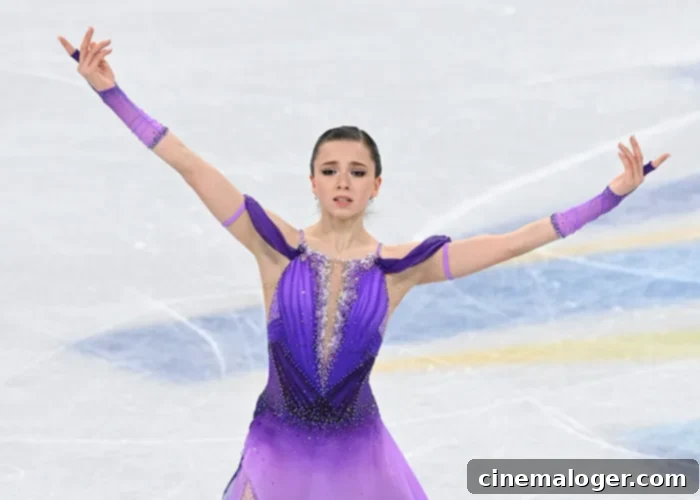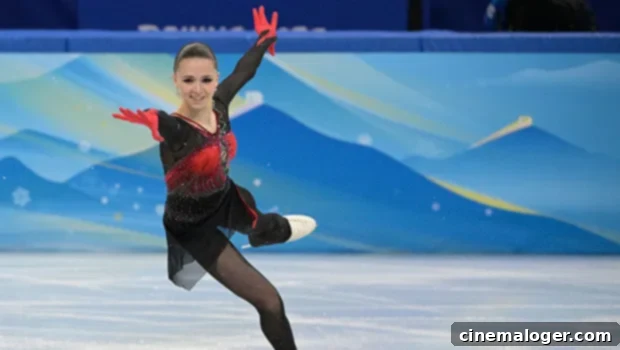Kamila Valieva Doping Scandal: Unpacking the Ban, Quad Jump History, and Olympic Legacy
The world of figure skating was captivated and then stunned by the story of Kamila Valieva, a prodigious talent whose promising career was dramatically altered by a doping scandal. At just 17 years old, the athlete faced a four-year ban from competition after testing positive for a prohibited substance in 2021, a ruling that reverberated throughout the international sports community and cast a long shadow over her achievements at the 2022 Winter Olympics.
Kamila Valieva, widely heralded as a future champion, arrived at the 2022 Winter Olympics in Beijing with immense expectations. Her exceptional skill and artistry on the ice positioned her as a strong contender for gold. However, her Olympic aspirations were quickly overshadowed when a drug test from December 2021 revealed the presence of a banned substance, trimetazidine. This discovery ignited a firestorm of controversy, dividing viewers, athletes, and officials worldwide regarding the fairness of her continued participation and the subsequent disqualification.
The Court of Arbitration for Sport (CAS) ultimately ruled to uphold a competitive ban against Valieva, a decision she and her legal team vigorously contested, asserting her innocence. The scandal peaked during the individual competition at the Beijing Games, where, under intense media scrutiny and immense pressure, Kamila struggled, failing to execute several key jumps in her program. She was visibly emotional and seen crying on the ice after her performance, ultimately missing out on an individual medal. This article delves deeper into Kamila Valieva’s remarkable skating career, the details of the doping controversy, and its profound implications for her future and the sport of figure skating.

A Teenage Prodigy at the 2022 Olympics
Kamila Valieva was remarkably young when she first stepped onto the Olympic stage. During the 2022 Winter Olympics in Beijing, she was just 15 years old, a testament to her prodigious talent and early ascent in the demanding world of competitive figure skating. Her youth became a significant point of discussion once the doping scandal broke, raising questions about the responsibility placed on minor athletes in high-stakes environments. Despite her tender age, Valieva played a pivotal role in the team event, helping the Russian Olympic Committee (ROC) secure a first-place finish ahead of formidable competitors, including the United States. Her performances were marked by an extraordinary combination of technical prowess and artistic expression, cementing her status as a generational talent even before the controversy erupted.
Making History: The First Woman to Land a Quad Jump at the Olympics
Beyond the controversy, Kamila Valieva etched her name into Olympic history with an unparalleled athletic feat. While numerous male skaters have successfully executed a quadruple jump, only a select few athletes, particularly women, have managed to accomplish this incredibly difficult maneuver in a professional competition. Kamila Valieva became the first woman ever to land a quadruple jump in Olympic history. This groundbreaking achievement occurred during the team event at the 2022 Beijing Games, where she flawlessly performed not one, but two quadruple jumps – a quad salchow and a quad toe loop – in addition to a clean triple axel. This momentous accomplishment underscored her revolutionary impact on the sport, pushing the boundaries of what was thought possible in women’s figure skating and setting a new benchmark for technical difficulty. Her ability to combine such demanding jumps with elegant artistry showcased her unique potential to redefine the sport.
Kamila’s Creative Flair: Recreating the ‘Wednesday’ Dance on Ice
Away from the intense pressures of Olympic competition and the doping scandal, Kamila Valieva also showcased her creative and playful side, earning her widespread recognition beyond her athletic achievements. One of her most celebrated and viral performances involved recreating the iconic “Wednesday” dance from the hit Netflix series. Performing to The Cramps’ “Goo Goo Muck,” the same song Jenna Ortega famously danced to as Wednesday Addams, Kamila’s routine captivated audiences globally. This performance highlighted her exceptional artistry and ability to connect with popular culture.
Olympian Kamila Valieva recreated Jenny Ortega’s dance in Netflix’s hit show ‘Wednesday’ while competing in the Russian Figure Skating Championships. pic.twitter.com/jirqfn5ERt
— CNN (@CNN) December 30, 2022
For this memorable performance, Valieva fully embraced the character, donning a costume reminiscent of Wednesday Addams’ Rave’n dance dress and sporting a black wig with the character’s signature pigtails. She opened the program with a charming reenactment of Thing’s hand, seamlessly transitioning onto the ice. Throughout the routine, while flawlessly executing her signature jumps and spins, Kamila made sure to perform the actual dance sequence, maintaining character with an impressive blend of technical skill and theatrical presence. This program not only demonstrated her versatility as a performer but also offered a glimpse into her personality outside of the rigorous demands of competitive skating, endearing her to a broader audience.
The Doping Controversy: A Four-Year Ban from Competition
The turning point in Kamila Valieva’s burgeoning career arrived during the 2022 Winter Olympics when it was revealed that she had tested positive for trimetazidine (TMZ). Trimetazidine is a heart medication used to treat conditions like angina, improving blood flow and efficiency. Crucially, TMZ is listed by the World Anti-Doping Agency (WADA) as a prohibited substance, categorized as a “metabolic modulator” that can enhance endurance and recovery, thereby offering an unfair competitive advantage.
Kamila Valieva’s Defense and the CAS Ruling
In response to the positive test, Kamila Valieva staunchly defended her innocence, claiming she was unaware of how the drug entered her system. Her legal team put forward a unique defense, suggesting indirect contamination. As reported by NBC, their primary argument was that her grandfather, who regularly took trimetazidine for his heart condition, may have inadvertently contaminated a strawberry dessert that Kamila consumed around the time of her 2021 competitions. The attorneys further elaborated that her grandfather habitually used the same cutting board for years to prepare both his medication and food, creating a plausible pathway for cross-contamination.
Despite Kamila’s impassioned defense, the Court of Arbitration for Sport (CAS) panel ultimately found against her. While the panel reportedly acknowledged Valieva as an “honest, straightforward and credible witness,” they concluded that her argument lacked “concrete” evidence to substantiate the claim of accidental contamination. The principle of strict liability in anti-doping regulations means that athletes are ultimately responsible for any prohibited substance found in their bodies, regardless of intent. As a result of this ruling, Kamila Valieva was handed a four-year ban from competition. The ban was backdated to December 25, 2021, the date her contaminated drug test sample was submitted. This decision meant she would be ineligible to compete until late 2025, effectively sidelining her during crucial years of her athletic prime.
Broader Implications for Russian and Belarusian Athletes
Adding another layer of complexity to the situation, all figure skaters from Russia and Belarus were also banned from attending the 2022 World Championships. This broader prohibition was a direct consequence of Russia’s aggressive invasion of Ukraine, demonstrating the far-reaching political implications that can impact international sporting events and individual athletes.
Kamila’s Gold Medal Was Taken Away: The Reallocation of Olympic Honors
One of the most significant consequences of the doping scandal was the reallocation of the gold medal that Kamila Valieva had helped the Russian Olympic Committee (ROC) secure in the team event at the 2022 Winter Olympics. Following the CAS ruling and the confirmation of her positive drug test, the integrity of the team event results was compromised. In January 2024, nearly two years after the Beijing Games, the International Skating Union (ISU) officially reallocated the medals. As reported by the Associated Press, the gold medal for the team event was subsequently awarded to the United States team. Japan moved up to silver, and Canada received the bronze medal. This re-ordering of results underscored the severe repercussions of doping violations, not only for individual athletes but for entire teams and national Olympic committees, altering the historical record of the Games.
The Lasting Impact and Legacy
The case of Kamila Valieva has left an indelible mark on the world of figure skating and international sports. It ignited a global debate about the protection of minor athletes in high-performance environments, the effectiveness of anti-doping protocols, and the complexities of strict liability. While her career achievements, particularly her historic quad jump and captivating performances like the ‘Wednesday’ dance, will forever be part of her legacy, they are now intertwined with the controversial doping ban. The scandal has prompted a re-evaluation of age limits in competitive skating and renewed calls for more stringent and transparent anti-doping measures, especially concerning young athletes. Kamila Valieva’s story serves as a poignant reminder of the fragility of sporting dreams and the relentless pursuit of fairness in global competition.
